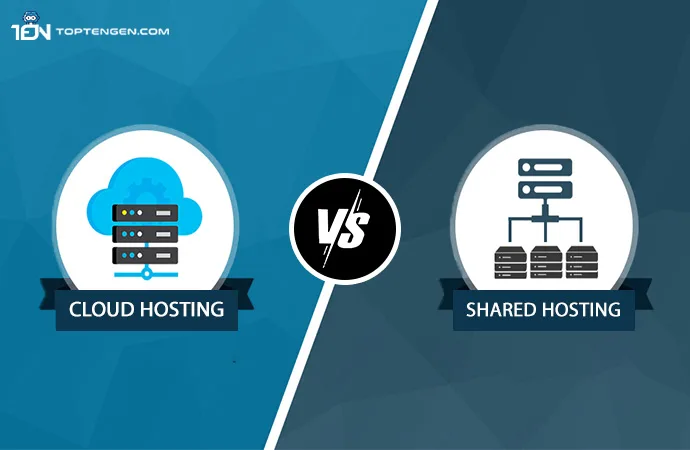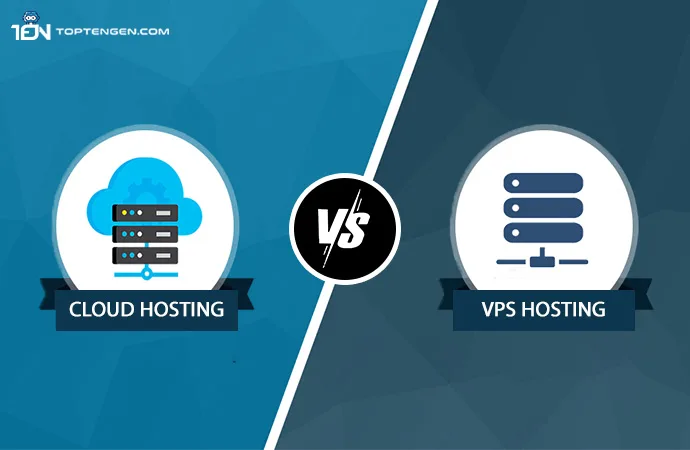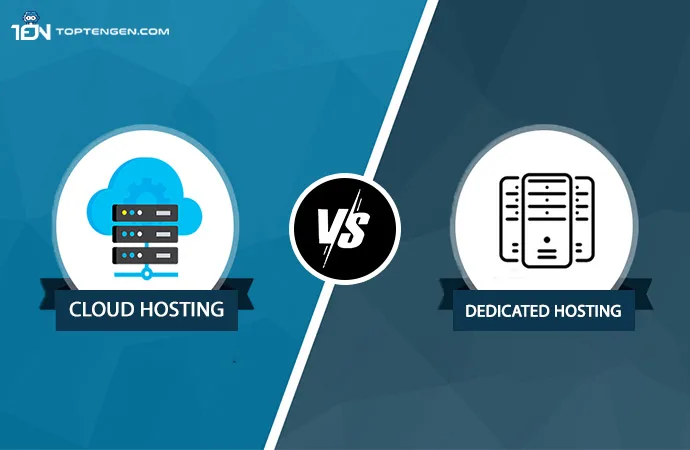If you covet a secure, fast, and scalable website then cloud hosting is the way to go. In cloud hosting, you won’t have to share computing power with other websites as you will get a dedicated resource pool. This allows for a better user experience, ensuring speedy content delivery, and stable performance. In this article, we will answer a very important question What is cloud hosting? So, grab your reading glasses, and get learning.
What is Cloud Hosting?
Cloud hosting is a type of web hosting service that utilizes the power of server virtualization. It pools computing resources from a network of virtual and physical servers, facilitating greater flexibility and scalability. With this type of hosting, you get high uptime and a fast-performing website. In layman’s terms, cloud hosting is the crème de la crème of hosting, facilitating greater security and enhancing speed.
How Does it Work?
Cloud hosting doesn’t work the same way web hosting does. Web hosting uses a centralized approach, utilizing a single web server to host multiple websites. Therefore, as the computing power and storage are shared among multiple websites, a surge in traffic from a neighboring site can drastically slow down your website. Whereas on the other hand, cloud hosting utilises virtualisation, dividing a physical server into multiple virtual servers. Cloud utilises a network of servers to host a website, allowing for better stability and performance as compared to single-server hosting, making cloud hosting a suitable choice for websites that receive heavy traffic like e-commerce stores.
Benefits
Scalability
Cloud hosting makes scalability easy as it does not rely on a single server in order to store and deliver content. Therefore, it can be seamlessly scaled in order to meet the demands of a website.
Greater Security
With cloud hosting, you get better security as it uses multiple virtual machines that are less prone to hardware malfunctions. By providing robust physical and virtual security of servers, cloud hosting helps protect website and application data from malicious acts. Cloud hosting security includes identity management and access control, Secure Sockets Layers or SSL for transmitting data, firewall, and much more.
Beginner-Friendly
Managed cloud hosting is a beginner-friendly option as it doesn’t require any technical knowledge. The responsibility for maintaining the cloud server falls under the service provider.
Pay-as-You-GO
Cloud hosting employs the pay-as-you-go model. This means that depending on the usage, the cost can be scaled up or down.
Reliability and Performance
With this hosting, you get more reliability and uptime as it takes advantage of numerous servers that are spread across the cloud network. In case one server fails, another server in the network can fill in and perform its duties.
Check out Top 10 Benefits of Cloud Hosting to know more about the perks offered by it.
Public Cloud vs Private Cloud: What’s the Difference
When it comes to cloud hosting, these two types i.e., public cloud and private cloud usually confuse people. To elude you from confusion we compared the two and here is what we found out.
| Public cloud | Private cloud |
| Multi-tenant infrastructure | Single-tenant infrastructure |
| Minimal control | Maximum control |
| Highly scalable and flexible | Customizable |
| Less secure | Highly isolated and secure |
| No hardware or software purchases required | Operates in your chosen cloud or on-premises data center |
Public Cloud
Public cloud operate on a shared infrastructure that comes under the management and maintenance of their cloud provider such as Microsoft Azure, Oracle Cloud, Google Cloud Platform, and Amazon Web Services. Your chosen cloud provider operates and manages the infrastructure, hosting, storage, maintenance, and resources. Public clouds are also quite flexible and give you the freedom to scale up and down easily.
Benefits
- No major upfront costs
- Scaling is flexible
- Low maintenance
- There are fewer wasted resources
- Pay-as-you-go pricing
Private Cloud
A private cloud is an isolated deployment option, accessed and controlled by a single organization. With a private cloud, you get the option to either store your data center resources on the premises or with a third-party vendor.
Benefits
- Completely controlled by your organization
- Extremely secure due to lack of shared infrastructure.
- Highly customizable
Cloud Hosting Comparison with Other Hosting Types
Cloud Hosting vs. Shared Hosting

With shared hosting, you get limited storage capacity, bandwidth, and processing power, as only one server hosts multiple websites, and its resources are shared among them. However, one perk of shared hosting is that it is inexpensive. The cost of server maintenance is divided between the users, making it much more affordable. This is not the case with cloud hosting making it a more expensive option. Therefore, shared hosting is a perfect hosting option for small businesses and personal websites.
To know more about shared hosting, refer to our Ultimate Guide to Shared Web Hosting.
Advantages of Shared Hosting
Affordable hosting – Among all hosting types, shared hosting is the most affordable one. It costs anywhere between $2 to $20 per month. Whereas on the other hand, cloud hosting is more on the expensive side and costs about $10 to $170 per month. Depending on the web host you opt for the price can go higher than $70.
Beginner-friendly – If you are looking for a more beginner-friendly hosting service, then shared hosting is the way to go as with shared hosting you don’t need to have any coding skills to get your website up and running.
Easy maintenance – In shared hosting all the technical aspects of maintaining a website are handled by the web host.
Disadvantages of Shared Hosting
Limited resources – With shared hosting you can’t achieve top-notch website performance as the processing power, bandwidth, and storage capacity is limited.
Shared IP address – In shared hosting, you have to share an IP address with other sites. This presents a lot of problems as Google and Yahoo associate shared IPs with spam, hampering your email deliverability.
Security risks – If one website on the shared server gets infected with a virus the other websites hosted on the server will also get compromised.
Cloud Hosting vs. VPS Hosting

Cloud hosting and VPS hosting employs the same working principle, virtualization. By utilizing virtualization, VPS separates a physical server into multiple virtual servers. Each virtual server is an independent entity, harboring its own resources. This way each user gets allocated resources to grow their website. Moreover, with VPS you also get root access, which gives you more control over the hosting environment, a feature not available with shared and managed cloud hosting.
If you wish to learn more about VPS hosting refer to our Complete Guide to VPS Hosting.
Advantages of VPS Hosting
Customizability – VPS hosting is highly customizable. Its virtual private servers offer more flexibility than managed cloud hosting in terms of server configuration.
Stable performance – With VPS hosting your website performance remains stable as each website gets dedicated resources. Which means that a traffic surge on one website hosted on the server with not affect the other websites.
Dedicated IP address – Both VPS and cloud hosting offer dedicated IP address that allows for better protection and improves credibility.
Disadvantages of VPS Hosting
Not beginner-friendly – To manage VPS hosting one must possess the required technical knowledge and skills. This aspect renders VPS hosting non-beginner friendly.
Cloud Hosting vs. Dedicated Hosting

Dedicated hosting is the most robust hosting type as it gives you full control over an entire server. This means that all of the server’s available resources are at your disposal, and you have the freedom to install custom software. However, dedicated hosting is a lot more expensive than cloud hosting and is, therefore, geared towards large organizations that have the budget to afford it.
To enhance your knowledge of dedicated servers, refer to our Ultimate Guide to Picking the Best Dedicated Server.
Advantages of Dedicated Hosting
Great performance – With all the server resources at your disposal, your website’s performance and speed improves drastically.
Full and utter control – With dedicated hosting, you can fully control the hosting environment. It allows you to customize the operation system and install server-wide software as you please.
Unlimited resources – With dedicated hosting, you get the entire server resources and can use them as you please.
Disadvantages of Dedicated Hosting
Expensive – Dedicated servers have the highest maintenance cost as compared to other hosting types, costing anywhere between $80 to $500 per month.
Requires advanced technical skills – In order to operate and maintain a dedicated server, one must have server management knowledge.
Who Should Use Cloud Hosting?
If you want a stable website performance and lack the skills to maintain your own server then you should go for cloud hosting. Moreover, cloud hosting is also a great option if you desire dedicated bandwidth, disk space, processing power, and top-notch security at an affordable price. Some websites that would benefit greatly by opting for cloud hosting are large-scale blogs, search engines, new publications, and aggregator sites.
Popular Cloud Hosting Providers
| Service Providers | InMotion | Bluehost | HostGator |
| Security | Excellent | Excellent | Excellent |
| Hosting package | Quite comprehensive | Least comprehensive | Fairly comprehensive |
| Bandwidth | Unlimited | Unmetered | Unmetered |
| Dedicated disk space | Limited (2TB) | Limited (1TB) | Limited (500GB) |
| Number of flexible hosting plans | 2 | 4 | 5 |
| Customer support | 24/7 live chat, email, phone, forums, and knowledge base | 24/7 live chat, phone, email, knowledge base, forums | 24/7 live chat, phone, email, knowledge base, forums |
InMotion Hosting – InMotion Hosting is among the leading website hosting providers. The website host is quite easy to use, making it a great choice for beginners trying to enter the web hosting world. Although not advertised as much, it does offer robust cloud hosting. With Cloud hosting it offers easy-to-use one-click tools and powerful security features. InMotion Hosting also offers a website builder called BoldGrid, making it an all-in-one website solution. The web-builder comes with customisable and responsive templates and is also packed with robust tools.
BlueHost – BlueHost is one of the best website hosting providers available in the market right now. Its great uptime, tools, and features make it the most coveted web host, and is currently hosting over 2 million websites. BlueHost’s Cloud Hosting is quite robust complete with unmetered bandwidth, a great uptime, and several security features like free SSL and spam experts.
HostGator – HostGator is a leading website hosting provider and website builder. It’s reliability, speed, and affordability make it an ideal choice for small websites. With all of its Cloud hosting packages HostGator provides an intuitive dashboard, automated failover, data mirroring, resource management, and integrated caching.
